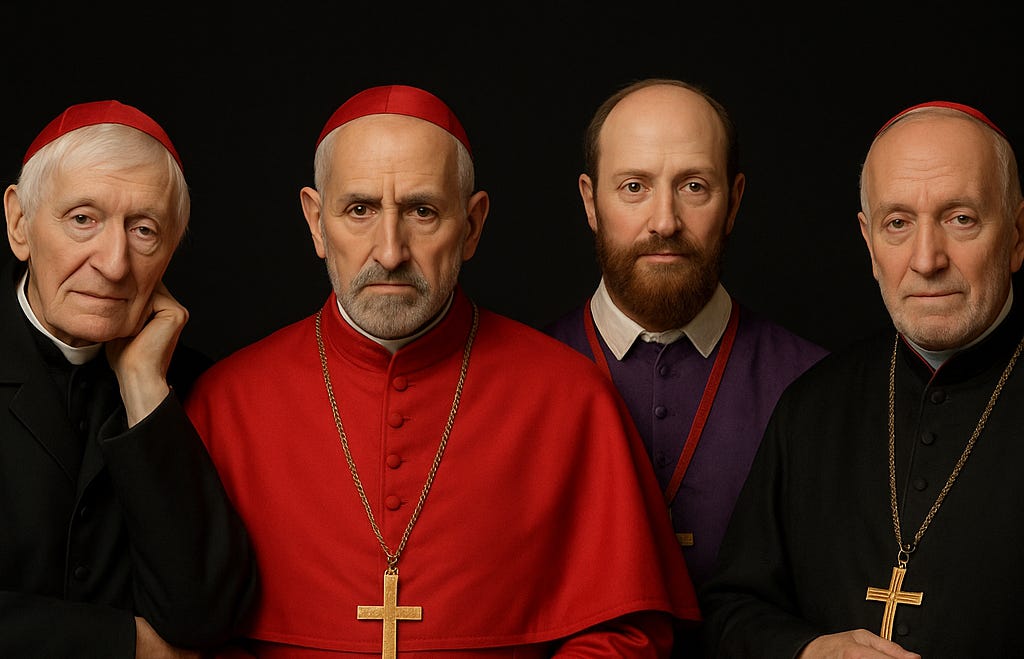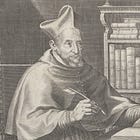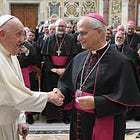Newman would be the fourth 'ipso facto loss of office' Doctor of the Church
How many Doctors of the Church can be cited in support of the contrary opinion?

How many Doctors of the Church can be cited in support of the contrary opinion?
(WM Round-Up) – Leo XIV has announced that Cardinal John Henry Newman will be declared a Doctor of the Church, becoming the 38th in Catholic history.
If this act were valid, then Newman would be the first English Doctor of the Church since St. Bede. The formal declaration is expected to take place later this year.
Unfortunately, we cannot recognise or celebrate the apparent conferral of this and other recent honours on our beloved Newman, due to the fact that the men conferring them have not been true popes.
However, we have some interesting information for those who do recognise the validity of this act.
In addition to providing arguments that refute modern ecumenism and religious liberty, and which would cast doubt on the validity of the new rites of Holy Orders (also here), Newman’s elevation to the status of Doctor of the Church would – if valid – have made him the fourth Doctor of the Church to state that a Pope who falls into heresy ipso facto loses office.
The three existing Doctors of the Church are:
St Robert Bellarmine
St Francis de Sales
St Alphonsus Liguori
This brief article will show what Newman and these Doctors of the Church said.
Cardinal Newman on the heretical pope
In the Postscript to his celebrated Letter to the Duke of Norfolk, Newman stated the principle in two places.
In the first, he represents the principle as completely respectable:
I have said, “The Pope, who comes of Revelation, has no jurisdiction over Nature,” i.e. the natural Law.
Mr. Gladstone on the other hand says,
“Idle it is to tell us, finally, that the Pope is bound by the moral and divine law, by the commandments of God, by the rules of the Gospel: ... for of these, one and all, the Pope himself, by himself, is the judge without appeal,” p. 102.
That is, Mr. Gladstone thinks that the Pope may deny and anathematize the proposition, “There is one God:” and may proceed to circulate by Cardinal Antonelli a whole Syllabus of kindred “erroneous theses” for the instruction of the Bishops.
Catholics think this impossible, as believing in a Divine Providence ever exercised over the Church. But let us grant, for argument-sake, that a Pope could commit so insane a violation of the Natural and the Revealed Law:—we know what would be the consequence to such a Pope.
Cardinal Turrecremata teaches, as I have quoted him, that “were the Pope to command anything {359} against Holy Scripture, or the articles of faith, or the truth of the Sacraments, or the commands of the natural or divine law, he ought not to be obeyed, but in such commands to be ignored.” Supr., p. 242.
Other, and they the highest Ultramontane theologians, hold that a Pope who teaches heresy ipso facto ceases to be Pope.1
In the second instance, he states this principle more clearly as his own:
Mr. Gladstone proceeds,
“Secondly, that, if bidden by the self-assertion of the Pope, he will be required by his principles to retract it, and to assert, if occasion should arise, the contrary.”
I can only say to so hypothetical an argument what is laid down by Fessler and the Swiss bishops, that the Pope cannot, by virtue of his infallibility, reverse what has always been held; and that the “inspiration” of the church, in the sense in which the Apostles were inspired, is contrary to our received teaching.
If Protestants are to speculate about our future, they should be impartial enough to recollect, that if, on the one hand, we believe that a Pope can add to our articles of faith, so, on the other, we hold also that a heretical Pope, ipso facto, ceases to be Pope by reason of his heresy, as I have said (supr., p. 359).2
St Robert Bellarmine
Bellarmine’s treatment of the Pope Heretic Question is still definitive and sufficient to arrive at certainty of the truth of the matter – namely that, if a Pope can fall into public heresy, he ipso facto loses office by his own act, without any declaration being possible (even if a declaration is useful, especially for moving towards a subsequent election). The same principles explain why a public heretic cannot be elected pope.
Bellarmine does not present this “fifth opinion” as an “opinion” in the sense that the word is normally understood: he presents it as certain, and the teaching of all the Fathers.
Some read his treatment of the “fifth opinion” and are left underwhelmed – this may be because its main defence is actually presented in his refutation of the fouth opinion.
It should be read in full – nonetheless, here is his conclusion:
“[T]he true opinion is the fifth, according to which the Pope who is manifestly a heretic ceases by himself to be Pope and head, in the same way as he ceases to be a Christian and a member of the body of the Church; and for this reason he can be judged and punished by the Church.
“This is the opinion of all the ancient Fathers, who teach that manifest heretics immediately lose all jurisdiction […]
“The foundation of this argument is that the manifest heretic is not in any way a member of the Church, that is, neither spiritually nor corporally, which signifies that he is not such by internal union nor by external union.
“For even bad Catholics [i.e. who are not heretics] are united and are members, spiritually by faith, corporally by confession of faith and by participation in the visible sacraments; the occult heretics are united and are members although only by external union; on the contrary, the good catechumens belong to the Church only by an internal union, not by the external; but manifest heretics do not pertain in any manner, as we have already proved.”3
See also:
St Francis de Sales
In The Catholic Controversy, St Francis de Sales wrote the following:
“Under the ancient law the High Priest did not wear the Rational except when he was vested in the pontifical robes and was entering before the Lord. Thus we do not say that the Pope cannot err in his private opinions, as did John XXII.; or be altogether a heretic as perhaps Honorius was.
“Now when he is explicitly a heretic, he falls ipso facto from his dignity and out of the Church, and the Church must either deprive him, or, as some say, declare him deprived, of his Apostolic See, and must say as S. Peter did: Let another take his bishopric.”
Let us be clear on what St Francis de Sales is saying here. He states first, and unequivocally:
“Now when he is explicitly a heretic falls ipso facto from his dignity and out of the Church…”
He then states what should happen next:
“… and the Church must either deprive him, or, as some say, declare him deprived, of his Apostolic See…”
The uncertainty, therefore, is not whether a heretic pope loses office ipso facto prior to any declaration. The declaration does not (and cannot) actually deprive a true pope of his office – the uncertainty is how to describe the purpose of such a declaration, in a way that is precise, and which does not contradict the absolute supremacy and injudicability of a true Pope.
Thankfully St Alphonsus Liguori provides a clear description of such a declaration, as we shall see shortly.
St Francis de Sales goes on to discuss the impossibility of a true Pope erring or teaching error when acting in his role as the shepherd of the universal Church.
“When he errs in his private opinion he must be instructed, advised, convinced ; as happened with John XXII., who was so far from dying obstinate or from determining anything during his life concerning his opinion, that he died whilst he was making the examination which is necessary for determining in a matter of faith, as his successor declared in the Extravagantes which begins Benedictus Deus.
“But when he is clothed with the pontifical garments, I mean when he teaches the whole Church as shepherd, in general matters of faith and morals, then there is nothing but doctrine and truth.”
He continues in the same vein, giving us further clarity: when we see an apparent Pope doing precisely what is impossible (namely, universally teaching error in an official capacity, promulgating evil laws to the whole Church), we can conclude with certainty that he is not a true Pope at all.
St Alphonsus Liguori
In the abstract of his doctoral dissertation The Theological Defense of Papal Power By St. Alphonsus Liguori, published by The Catholic University of America in 1961, Fr David J. Sharrock C.SS.R. provides the following text from St Alphonsus. The saint explains that loss of office is ipso facto, and that the purpose of the declaration – demonstating that it is not necessary in order for loss of office to occur.
Finally, the last question the Saint deals with is the position of a general Council in relation to an heretical Pope. He says:
“If the Pope ever, as a private person, were to fall into heresy, then at that moment, he would cease to be Pope, because he would then be outside the Church, and as such, would no longer be able to be the head of the Church.
“In this case, the Church would not depose him, because no one has authority above the Pope. It would simply declare that he had fallen from his pontificate. We have said: ‘if the Pope as a private person were to fall into heresy’, for the Pope, as Pope, ie. as teaching the whole Church ex cathedra, is not able to teach anything against faith...” [32]
But the Saint teaches that this heresy
… must be, a question of manifest and external heresy, not of an occult or mental heresy. [33]
And again:
Then (when he is a manifest and external heretic) the Pope is not deprived of his power, by the Council as by a superior, but... he is immediately despoiled of it by Christ... [34]4
Conclusion
There is an extraordinary amount that can, should and will be written about Newman’s apparent elevation to the status of Doctor of the Church – as well as what is meant by the title itself.
For now, we will leave simply point out that we could cite many other authorities in support of the conclusion in question – and ask the following question to those who claim that a manifestly heretical “Pope” does not lose his office ipso facto by his own act:
How many Doctors of the Church can you cite in support of your view?
Postscript
A few further points to be made on this topic.
Other authorities affirming the “ipso facto loss of office” conclusion
This was a brief article about Doctors of the Church which state or affirm the “fifth opinion” – and that, to our knowledge, none affirm the “third” or “fourth opinions” (namely, that a heretic pope retains office, either per se or until he is somehow deposed).
Nonetheless, we should note that the following may also be marshalled in support of the ipso facto loss of office conclusion:
St Vincent Ferrer (who claimed that Pedro de Luna had lost office due to manifest schism, due to his refusal to resign and end the Great Western Schism)5
Pope Paul IV (enshrining it in positive law in the bull Cum ex officio apostolatus)
Pope St Pius V (who reaffirmed Cum ex officio in his own document Inter multiplices)
The 1917 Code of Canon Law (in Can. 188 §4 – explained by Bishop G.V. McDevitt in 1946)
Cardinal Turrecremata (holding the “second opinion” – that loss of office takes place ipso facto, even for secret or internal heresy)
Cardinal Cajetan (who came to hold either the “second” or “fifth opinion” later in life)
Cardinal Louis Billot
The canonists Wernz & Vidal…
… and many more. Other such authors are cited by the late Fr Anthony Cekada and with even greater rigour by Eric Hoyle.
The principles behind the “fifth opinion”
It is important to bear in mind always that the “ipso facto loss of office” conclusion does not simply hang in the air, as if it were one intuition among many. It is the logical conclusion, drawn from absolutely certain premises.
As a result, the principles behind it also mean that a public heretic cannot be elected in the first place. They also apply, for the same reason, not just to heresy, but also to schism and apostasy.
These principles are expressed by “all the ancient Fathers” (according to Ss Robert Bellarmine and Jerome), as well as St Thomas Aquinas, Pope Pius XII, and the great body of traditional ecclesiology.
The authority of Doctors of the Church
The Doctors are appointed by the Church as our teachers, and we should learn from them. Mgr. Joseph Clifford Fenton explains that it is the Church who endows these men with her own authority:
“Doctrinally the naming of a Doctor constitutes a declaration by the Church that this eminent servant of God was remarkable alike for the holiness of his life and the effective orthodoxy of his teaching. Naturally this effective orthodoxy is incompatible with the presence of any substantial error about faith or morals in the books which he gave to the Church.
“There is also a positive connotation. Not only does the Church declare that there is no serious error in any of his work, but by the very fact that he is constituted as a Doctor, she commends that portion of his writing on which he may be said to have specialized and because of which he is entered upon the list of Doctors.”6
Naturally, we are not claiming that the comment found in St Francis de Sales does constitutes a “portion of his writing on which he may be said to have specialized”, as Fenton puts it – and the same would apply to Newman, were he actually a Doctor of the Church. Nor are we suggesting that three (or even four) Doctors constitutes a consensus on their own, such that denying the “Fifth Opinion” would incur a canonical penalty.
However, it is overly simplistic to claim that the “fifth opinion” has not been taught by the magisterium, or that such questions are not settled by Doctors of the Church. This is to miss the greater point – which is that naming someone a Doctor is itself a way in which the Church exercises her magisterium.
As such, we feel entitled to repeat the same question to those who say that a manifestly heretical “Pope” does not lose his office ipso facto by his own act:
How many Doctors of the Church can be cited in support of your view?
HELP KEEP THE WM REVIEW ONLINE WITH WM+!
As we expand The WM Review we would like to keep providing free articles for everyone.
Our work takes a lot of time and effort to produce. If you have benefitted from it please do consider supporting us financially.
A subscription gets you access to our exclusive WM+ material, and helps ensure that we can keep writing and sharing free material for all.
You can see what readers are saying over at our Testimonials page.
(We make our WM+ material freely available to clergy, priests and seminarians upon request. Please subscribe and reply to the email if this applies to you.)
Subscribe to WM+ now to make sure you always receive our material. Thank you!
Read Next:
Follow on Twitter, YouTube and Telegram:
John Henry Newman, Letter to the Duke of Norfolk, 1875, Post-script, p 359. Published in Certain Difficulties felt by Anglicans in Catholic Teaching Considered, Vol. II. Longmans, Green, and Co., London, 1900. Available at https://www.newmanreader.org/works/anglicans/volume2/gladstone/postscript.html
Ibid. 377-8
Fr David J. Sharrock C.SS.R., The Theological Defense of Papal Power By St. Alphonsus Liguori, published by The Catholic University of America in 1961, p 88.
Sharrock provides citations in abbreviated form. We have expanded them as follows:
Vindiciae 8, 8 (ODW I, 445). cf. Verita della Fede 3, 9, 30 (OON 8, 192); ODW I, 321).
Dissertatio de Rom. Pont. 121 (OMG I, 107).
Ibid, cf. also Verita della Fede 3, 9, 37 (OON 8, 195; ODW I, 326).
The general collections
ODW: Opera Dogmatica Sancti Alphonis, ed. A. Walter (1903, 2 Vols.)
OON: Opere di S. Alfonso de Liguori, (seems to be 1871, 8 vols.)
OMG: Opera Moralia Sancti Alphonsi, ed. L. Gaude (4 Vols., 1905-12)
The specific works
Dissertatio de Romani Pontificis... OMG I, 93-121
Verita della Fede contro i materialisti che negana l'esistenza di Dio..... OON 8, 1-245, ODW 1, 99-378)
Vindiciae pro Suprema Romani Pontificis.... ODW I, 383-459
Mgr Joseph Clifford Fenton, The Concept of Sacred Theology, published as What is Sacred Theology? Cluny Media, Providence RI, 2018. (UK readers). p 155






This one article is worth your entire theological output. It is SO helpful! You just synthesized a now irrefutable “opinion “ re. automatic loss of office , which establishes the Sede V. position on St Peter’s Rock. You brought light when there was uncertainty. You made what was complex so simple to understand. Thank you! 🙏
Great article, well written, very convincing.